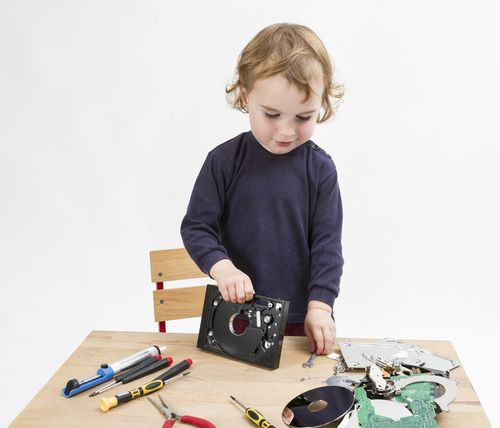Are Preschoolers Tech-Savvier Than College Students? How Flexible Learning May Improve Cognitive Reasoning

Whether it’s the new iPhone, a Blue-ray player, or a GPS navigation system, we often find ourselves scratching our heads and reading the manual from cover to cover trying to figure out the latest gadgets. In these situations, parents are inclined to ask their kids for help, but who should they choose? Preschoolers, not college students, according to a study in the journal Cognition. Researchers found preschoolers are more likely to be tech-savvier than college students because of their ability to be flexible learners in their ideas about cause and effect.
"As far as we know, this is the first study examining whether children can learn abstract cause and effect relationships, and comparing them to adults," said Alison Gopnik, senior author of the paper, and a developmental psychologist at the University of California, Berkeley, in the news release. Generally, as we get older, we become more skillful at inferring casual relations, even from only a few observations. However, having prior knowledge about encountering casual relations of various types and their nature relating to the causes and effects, could also the hinder the ability to be unbiased about these ideas.
A team of researchers at UC Berkeley sought to examine how preschoolers and college undergrads figured out a gizmo. The researchers recruited 106 preschoolers between the ages of 4 and 5, and 170 undergraduate students to take part in the study in a game called “Blickets.” The clay shapes, also known as blickets, included: cubes, pyramids, cylinders, etc. were placed on a red-topped box to see which of the widgets — either individually or in combination — could activate the machine to light up and play music.
Between the two study groups, the researchers found a difference in the participants’ response to changing evidence in the blicket demonstrations. Children were more likely to catch on to the pattern: Unusual combinations of the blickets could make the gadget work. The college students approached the machine as if it would always follow the common and obvious rule, even though they were told in the training that the gadget might work differently.
The authors speculate the adults were more likely to ignore the training and not try the unusual combinations because it didn’t match what they had previously experienced in the world. Their previous inferences in various casual relations led them to make more mistakes and have a harder time developing the new skills. “The very fact that children know less to begin with may, paradoxically, make them better, or at least more open-minded, learners. The plasticity of early beliefs may help to explain the bold exploration and breathtaking innovation that characterizes children’s learning," the authors wrote.
Overall, the study proposes children are more flexible learners because they are either free from the preconceptions that adults have, or they are fundamentally more flexible or exploratory in their surroundings. Children’s minds and brains are well-equipped to deal with variability and innovation. Therefore, kids are more likely to follow Bayesian logic — assessing the probability of possible outcomes based on drawing inferences.
Gopnik believes childhood and childhood play could be the beginning of flexible learning, gradually morphing into more narrow inferences based on casual relations. Children are more likely than adults to be less biased by prior assumptions or inferences, and pay more attention to current evidence to form a conclusion — consistent with the Bayesian model. Preschoolers could use their cognitive smarts to teach parents, including college students a lot about learning.
Source: Bridgers S, Gopnik A, Griffiths TL, and Lucas CG. When children are better (or at least more open-minded) learners than adults: Developmental differences in learning the forms of causal relationships. Cognition. 2014.
Published by Medicaldaily.com



























